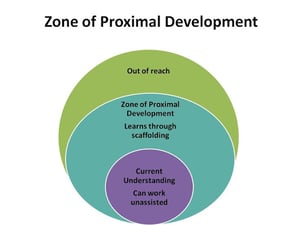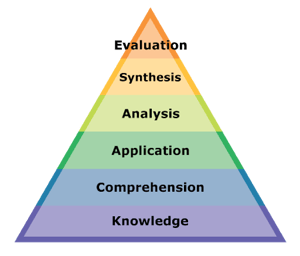
‘IDK’, if you didn’t know, is a feature of text-speak that has now planted itself firmly into modern parlance as a rapid, shorthand response to a difficult question - ‘I don’t know’.
When we ask Year 7 students what they think is happening when a raw egg appears to ‘cook’ in the presence of a mysterious chemical at room temperature there is no expectation that they will immediately regale us with an exposition of the denaturing of the egg’s protein bonds. Instead we hope that they will hypothesise possible explanations by using what they already know together with their own ideas and observations. It therefore sits at the very heart of a teacher’s role to encourage students to develop, share and test their thinking processes ‘out loud’ rather than respond to questions in a binary manner with either a firmly posited answer or simply ‘IDK’. The most effective way to do this is through skillful questioning that emphasises and stimulates the thinking process rather than focusing too intently or immediately on the ultimate answer, if indeed there is one. So often during the learning journey we are faced with questions that test the limits of our current understanding or knowledge. Indeed, such questions are essential to our progress along this journey as we move towards our learning goals. However, it’s not necessarily just what we know in these critical moments of the learning process where we endeavour to push these limits. It is what we think that really counts when we are faced with a truly perplexing question if we are to develop the cognitive skills that will enable us to be better learners in the future.
We spend a significant part of our education answering questions. We tentatively impart our knowledge, demonstrate our understanding and expound our interpretations of theoretical principle or practical observation through our responses to queries posed by teachers, examiners and peers alike. This becomes most crucial when reaching the culmination of a significant phase of study in order to measure progress and assess proficiency within a particular subject as part of the examination process.
However, the questions asked of learners should not be exclusively reserved to establish what is or is not known, or to formally validate learning and determine an achievement grade. The best questions seek to extend and deepen learning by revealing and challenging our thought processes in order that we may become more aware of why we reach particular answers and that we deliberately practice cognitive processes which prove to be successful in navigating new intellectual ground.
Moreover, it’s not necessarily just answering questions that gives them value. From a learner’s perspective questions are our most intuitive pedagogical tools and their true power is realised when learners optimise their ability to ask them incisively. Even as infants, before we acquire the linguistic proficiency to form coherent statements of inquiry, we are instinctively driven by an insatiable curiosity about the world around us. This, in turn, leads us to suppose, to hypothesise, to associate known facts with lived experience and to construct an understanding of phenomena around us.
The important thing is not to stop questioning. Curiosity has its own reason for existing...
In exploring the full capacity of questioning to drive learning we must consider exactly how questions can help teachers and parents to understand learners. Well structured and skillfully worded questions, focused on processes rather than outcomes, can significantly improve learners’ understanding of subject matter. More importantly they can improve learners’ knowledge of themselves and the idiosyncratic ways in which they interact with information.
John Hattie’s seminal research into the most prominent factors affecting learner progress recognises the importance of effective questioning, suggesting that, when done well, it can significantly enhance students’ achievement by the equivalent of almost a full GCSE grade. Furthermore, his evidence, compiled from over 50,000 global research studies, concludes that the value of questioning increases when students are guided to pose questions to themselves in order to prompt metacognition - a developed self-awareness of one’s own thought processes which makes learning more ‘visible’. (Hattie, 2009).
 Some understanding of what makes good questioning can be derived from a number of sources. A good place to start is Vygotsky’s Zone of Proximal Development which outlines how learners, with the help of a significant other, can bridge the gap between what they know/can do to what they don’t yet know or can’t yet do. This process, known as scaffolding requires a staged process of dialogue in which the learner is guided through cognitive associations or links made possible through effective questioning.
Some understanding of what makes good questioning can be derived from a number of sources. A good place to start is Vygotsky’s Zone of Proximal Development which outlines how learners, with the help of a significant other, can bridge the gap between what they know/can do to what they don’t yet know or can’t yet do. This process, known as scaffolding requires a staged process of dialogue in which the learner is guided through cognitive associations or links made possible through effective questioning.
 However, asking questions per se is not a guarantee for success, and it’s not just what is asked, but indeed how, why and when we ask that really matters. How questioning can progress from simple, factual recall to more complex, high-order thinking is best exemplified by Bloom’s Taxonomy (right), a hierarchical model for structuring the different ways in which our thought processes can be conceptualised as managing, interpreting and reinterpreting information:
However, asking questions per se is not a guarantee for success, and it’s not just what is asked, but indeed how, why and when we ask that really matters. How questioning can progress from simple, factual recall to more complex, high-order thinking is best exemplified by Bloom’s Taxonomy (right), a hierarchical model for structuring the different ways in which our thought processes can be conceptualised as managing, interpreting and reinterpreting information:
- Evaluation – make judgments about the value of ideas/things
- Synthesis – combine parts to form new meaning,
- Analysis – separate concepts into parts; distinguish between facts and inferences
- Application – use a concept in a new situation
- Comprehension – understand meaning
- Knowledge – recall data or information
When phrasing our questions using a model such as Bloom’s we can deliberately consider exactly what cognitive activity we want to encourage and understand in a learner rather than target a single correct answer which possibly relies on relatively low-order thinking or, worse still, obscures the thought process altogether.
True knowledge exists in knowing that you know nothing…
To establish how we might pose our questions, The Socratic Method offers a useful philosophical framework from which to consider how questions can be worded and sequenced to elicit responses which deepen learners’ understanding and reveal their metacognitive inner-workings. This method relies on open-ended prompts which encourage learners to elaborate upon their thoughts and to consider opinions, propositions and assumptions from a range of perspectives. There are rarely single correct answers to Socratic questions - the learning value is in the reasoning behind them:
- How does this tie in with what we learned before? (Establishing the ZPD)
- How would your answer be different if…? (Application/evaluation/synthesis)
- What is the counterargument for that? (Evaluation)
- What are some possible implications of this? (Prediction / hypothesis / synthesis)
- How would you summarise this? (Analysis)
- What evidence from the text supports that claim? (Application - using information)
- What’s the reasoning behind your answer? (Metacognition)
Finally, a much less classical but nonetheless intriguing development in the area of questioning for learning is Ian Gilbert’s ‘Thunks’. In Gilbert’s own words, ‘a Thunk is a beguilingly simple-looking question about everyday things that stops you in your tracks and helps you start to look at the world in a whole new light.’ The purpose of these questions is to encourage divergent, creative and philosophical reasoning, often about the most abstract or inane topics:
- If 0 degrees is a temperature, is 0 centimetres a height?
- Is it wrong if someone swears at you in a language you don’t understand?
- Is the gap between the notes music?
- Do you use your imagination when you dream?
- If you believe your own lies, are they lies?
Try a few of these at home - if tackled frequently, and with gusto, these may well boost your child’s capacity for critical reasoning or, at the very least, prompt some rather entertaining conversations…
Dave Potts, Vice Principal for Learning & Teaching at the Alice Smith School.



